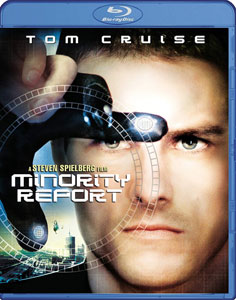Director Steven Spielberg’s “Minority Report” (2002) isn’t the most by-the-book adaptation of a Philip K. Dick story (most agree that’s “A Scanner Darkly”). But it respects the themes and messages of the 1956 short story and it’s ultimately one of the best movies inspired by his work. In addition to being a propulsive blockbuster actioner starring Tom Cruise, it’s also an irresistibly detailed vision of 2054 that lets us mull the pros and cons of precrime even as Cruise’s John Anderton tries to solve a tangled mystery.
Future crime: The future of crimefighting
Granted, there’s little question that the film – sharply written by Scott Frank and John Cohen – illustrates the immorality of locking people up for something they “would have done.” None of those roughly 1,000 incarcerated “criminals” was given a chance to change their minds about the murder they might commit. When events conspire to temporarily shut down the precogs’ visions, two people in the movie are given this rare chance, and both choose to not commit the pre-ordained murder.
“Minority Report” also gives the other side: Washington, D.C., site of the precrime pilot program, has gone six years without a murder. While it doesn’t make me change my mind about the inherent wrongness of precrime, six years without murder can’t be brushed aside without a closer look.

“Minority Report” (2002)
Director: Steven Spielberg
Writers: Scott Frank, Jon Cohen, Philip K. Dick
Stars: Tom Cruise, Colin Farrell, Samantha Morton
The world-building of “Minority Report” – shot by Janusz Kamiński in a palette that evokes black and white while still being in color – goes beyond PKD’s story and is perhaps inspired by the author’s wider catalog. The film includes an authority figure who is above the law and who manipulates the system to his own ends, and — even more precisely Dickian — a VR lounge where you can live out your fantasies. We see not one but two Dickian Sad Sacks patronizing the joint: one who wants to kill his boss, and one who just wants to receive compliments.
Even if you set the precrime program aside, this 2054 is very much a police/spy state, and we see a mix of opinions about whether the sacrifices are worth the benefits.
People who have been saved by precrime feature in commercials encouraging people to vote for national implementation of the program. (Perhaps some of Spielberg’s Pollyanna nature comes through in that people get to vote on this at all.)
Harrowing peek at what’s coming
When the precrime cops – led by Neal McDonough’s Fletcher – send robotic eye-reading spiders into a tenement, some residents submit to the eye reading without complaint (an arguing couple pauses for the scans, then resumes yelling) and some are seriously annoyed. It’s a small but harrowing moment when two kids are terrified of the spiders and a mother tries to tell them there’s nothing to be afraid of.

It also feels naïve in 2019 – although perhaps not so much in 2002 – that people would ultimately vote against the expansion of precrime and that all the imprisoned people are freed. They are closely watched by police, though, Anderton tells us in a voiceover.
Also, the Drug War is still going strong in 2054, and the danger of drugs is still used as a pretext for invading people’s privacy. Ironically, the precogs’ powers result from their mothers’ drug abuse, and the state has no problem with making these people’s lives worse if they serve the supposed greater good.
Spielberg’s movie includes one of the two delicious twists from the short story. The one it doesn’t include is what gives PKD’s story its title. There are three precogs, and in cases where the vote for whether an event will occur is 2-1, the minority report is dismissed. PKD’s story cleverly shows the mathematical and logical flaw that comes from this approach. Anderton is reacting to individual reports and therefore the inaccurate prediction is seen by two precogs, simply because of the order in which they get their visions.
Frank and Cohen drop the idea of the reports being viewed sequentially by Anderton and instead imagine that they’re all delivered at once, as a single report. Understanding that complexity plays better in books than in movies, I don’t blame them for the change. And they do retain the “minority report” notion (which is good, considering the title), although it proves to be a red herring. The real issue at play is the screenwriters’ invention of an “echo”; this is the systemic quirk manipulated by the villain.
One PKD twist retained
The PKD twist that is retained for the film is the delicious final dilemma faced by the villain: If he kills the hero, he shows that precrime works, but his life as a free man is over. If he doesn’t kill the hero, it shows that precrime isn’t foolproof, and he is professionally disgraced.
Spielberg’s film also includes a nice addition, which was later taken up by the “Minority Report” TV series (2015): the human rights (and the violation thereof) of the precogs. Although the short story lacks this element, PKD shows sympathy for the plight of people with special talents in other yarns; “Martian Time-Slip” comes to mind. Admittedly, at other times, such as in “The Golden Man,” he says mutants are worth fearing.
In order for their visions to be read by the cops, the three precogs spend their lives in a milk bath with their brains wired up. Despite being all brain, their lives are similar to that of a brain-dead person. Their caretaker, Wally (Daniel London), comes close to kissing Agatha (Samantha Morton) at one point; we’re almost in the realm of patient abuse here.
All about Agatha
Of the three precogs, the movie focuses on the most powerful one, Agatha, who is freed by Anderton. Our hero’s search for the man who kidnapped (and presumably killed) his son is more generic than something PKD would write.
But when Anderton confronts the kidnapper, the scene is spiced up by Agatha’s screams — visions of murders is not something one gets used to. Even when merely being driven through the city, Agatha is terrified, since she’s seeing the world for the first time. She could almost be an alien, like Leeloo from “The Fifth Element,” this is all so new to her.
Still, as scary as “now” is, it’s better than the future (which is nothing but murders to her), and also better than the past, as we learn that Agatha’s tragic life story is interwoven with the precrime program itself.
As human knowledge expands in the years ahead, we might learn how to peek into and manipulate points in time other than the present. From a variety of expertly realized angles, “Minority Report” warns us to tread carefully.

